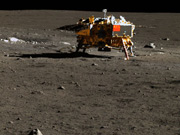

2. Strategic Investment: A Glimpse of Future Breakthrough
Scientists at CERN in search of the "God Particle" – Higgs boson. Decades of patient investment, for a moment of divine clarity.
The "God Particle" has been around since the dawn of time, and the search for proof of its existence is critical to our understanding of the nature, expansion, and potential fate of the universe. In order to unravel these mysteries, the European Organization for Nuclear Research (CERN) invested US$9 billion to construct the world's largest experimental facility—the Large Hadron Collider. In 2012, after decades of hard work by nearly 10,000 scientists, CERN at last announced the successful discovery of the Higgs boson, popularly known as the God Particle. The discovery of the Higgs boson sheds light on the nature of the cosmos, and is recognized as one of the greatest discoveries in modern physics.
This feat is no less difficult than landing on the moon. It took at total of 48 years from when CERN scientists first proposed their theory to its final lab verification. According to numbers released by Forbes that year (2012), the total cost of finding the Higgs boson amounted to US$13.25 billion. And before the results of their experiments were verified in the lab, the scientists at CERN had no idea whether or not 13 billion dollars in investment could actually lead to the discovery of the particle. What they were sure of, however, was that if they didn't have ongoing investment from multiple national funds, backed by the tireless probing of 10,000 physicists, it would have been difficult for Francois Englert François and Peter Higgs (the two physicists who won the Nobel Prize for discovering the Higgs boson) to have achieved their moment of victory.
Huawei's approach to strategic investment is similar to CERN's approach to seeking out the God Particle: ongoing, concentrated investment in strategic business areas, exploring the right direction along multiple paths at multiple layers in order to achieve breakthrough.
Looking at the numbers, over the past 10 years, Huawei has invested 240 billion RMB in research and innovation. In 2015, R&D expenditures were 50 billion RMB, accounting for 13% of annual sales revenue. Of their 170,000 employees, over 45% are involved in R&D. Huawei has 16 R&D Centers around the world, and 31 Joint Innovation Centers. They are a member of over 170 global standards organizations and open source communities. As of December 31, 2015, Huawei had accumulated a total of 50,377 patents, the result of 28 years of ongoing investment in R&D and talent.
Without long-term investment in technology, breakthrough in product design and development is impossible. Huawei's philosophy is, the minute they discover a strategic opportunity, they pounce on it with full force. They pile investment on the opportunity, both resources and intellectual capital. And not conservatively, either: they push bravely beyond their existing strengths to get ahead of the times with an open mind.
Chen Lifang, the President of Huawei's Public Affairs and Communications Department, noted that "the success of Huawei's mobile phones is a case in point. In fact, Huawei has been doing business in communications for over 20 years and has been working on mobile phones for over 10 years. We have improved our capabilities in areas such as chips, software, materials, aesthetic design, and processes. So, our success in mobile phones is not just down to chance; it is the fruit of years of effort."
Huawei's visionary leader Ren Zhengfei also emphasized that the company won't slacken its investment. In a recent interview, he noted that "Huawei invests heavily in strategic business areas along multiple paths at multiple layers. We can be investment-intensive to reduce the time needed to explore our direction. Out of the multiple opportunities we explore, some might become major industry trends. Then we will focus more efforts on these opportunities and less on others. However, we don't need to close the door on other opportunities."
It took CERN 48 years of exploration before they glimpsed the future in a moment of divine clarity. After 28 years of concentrated investment, Huawei has made major contributions to the era of big data traffic. It has been a long and difficult process of accumulated investment, but Huawei's people have also experienced their moment of divine clarity.
 |  |
Day|Week

 China releases HD true color images of lunar surface
China releases HD true color images of lunar surface To-be flight attendants undergo training at snow-covered field
To-be flight attendants undergo training at snow-covered field Aerial photos taken on J-11 fighter
Aerial photos taken on J-11 fighter 'Coldest town in China' — a fairyland you don't want to miss
'Coldest town in China' — a fairyland you don't want to miss Deep love for breathtaking Hainan
Deep love for breathtaking Hainan Beautiful Chinese tennis player Wang Qiang goes viral online
Beautiful Chinese tennis player Wang Qiang goes viral online Minus 71 degrees! Coldest village on earth
Minus 71 degrees! Coldest village on earth Chinese pole dancing master opens class in Tianjin
Chinese pole dancing master opens class in Tianjin The most beautiful town of snow in China
The most beautiful town of snow in China SWAT members hold romantic wedding in E China
SWAT members hold romantic wedding in E China